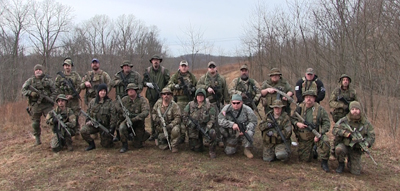Make Border Security Great Again – Privatize It!
Kerry Lutz
 The media continually informs us that there’s a crisis at the US southern border. However, little is being done about it. President Trump has his ideas and the Congress appears completely unwilling to act. Parts of the Wall are being built, but it can’t happen soon enough to quickly staunch the flow of illegals. Therefore, it’s time to take an approach that always works when it’s tried. Unleash the power of capitalism to solve this intractable problem. It’s time to privatize border enforcement. The media continually informs us that there’s a crisis at the US southern border. However, little is being done about it. President Trump has his ideas and the Congress appears completely unwilling to act. Parts of the Wall are being built, but it can’t happen soon enough to quickly staunch the flow of illegals. Therefore, it’s time to take an approach that always works when it’s tried. Unleash the power of capitalism to solve this intractable problem. It’s time to privatize border enforcement.
In the country’s early history law enforcement was largely a private affair. Bounty Hunters and Bail Enforcement Agents were a private solution to a public problem. Nearly 200 years of experience with Bounty Hunters and Bail Enforcement Agents (BEA’s) has shown them to be an extremely effective solution in apprehending a broad spectrum of criminals around the country. When an alleged criminal jumps bail or fails to appear for a court hearing, modern day BEA’s, working at the behest of Bail Bondsmen, apprehend large numbers of criminals and insure that justice is served. Today, most states as witnessed by Dog the Bounty Hunter, still rely upon private individuals to insure the swift apprehension of bail jumpers.
The practice was legitimized by the US Supreme Court in the 1873 case of Taylor v. Taintor, which recognized that bail bondsmen have sweeping rights to protect their bond and thus apprehend and even temporarily imprison their charges. Bail enforcement agents have rights superior to public law enforcement officers. A person out on bail expressly waives many constitutional protections, including the rights to refuse consent to search a dwelling and the entitlement to due process. Sometimes overzealous agents cause problems including even injury or death, but the legal system has been effective in dealing with these issues.
Extending the bounty hunter concept to illegal border crossers, who attempt entry into the United States, would result in reduced crossings and substantial cost savings. There are presently about 20,000 US Border Patrol Agents on the Mexican Border. They secure almost 2000 miles of border, 365 days per year, 24/7. Taking into account agent vacations, sick leave, pregnancy leave, holidays, extremely poor management and other factors, the actual number of agents on border patrol on any shift is often only in the hundreds.
And they are extremely costly. The Border Patrol is United States’ largest law enforcement agency. There are 62,500 employees including about 50,000 sworn agents. In 2016 the department’s budget was over $16 billion. Including non-labor related expenses and overhead, it expends over $200,000 per employee,. Last year they apprehended over 400,000 illegal Mexico border crossers; the average cost per apprehension was $10,000.
Here’s where the private sector comes in. The Border Patrol could certify training courses that all Independent Border Patrol Agents (IBPA’s) would complete in order to receive compensation for apprehending illegals. The US would give $500-1000 rewards/bounties to certified IBPA’s. Within weeks there would be 10’s of thousands of IBPA’s continually patrolling our border. In addition, they could earn additional bonuses for apprehension of convicted felons or repeat crossers. A coyote, escorting more than 10 people across, could yield another $2500. Once an apprehension is made, the bounty hunter would deliver the person(s) to a Border Patrol staging area where deportation or prosecution would take place. This would free up the US Border Patrol to concentrate more resources on capturing terrorists, drug smugglers and human traffickers, as well as creating more judges to deal with fraudulent asylum seekers and clearing up the huge backlog of pending cases.
Hundreds of thousands of illegals successfully cross the border each year, creating numerous problems throughout society. Even if the President and Congress doubled the number of Border Patrol Agents on the Mexican border to 40,000 tomorrow, there still wouldn’t be enough agents to stop the flow. Privatizing the apprehension of illegal border crossers would free up law enforcement to address more important threats and dramatically increase the number of apprehensions made and once again Make America’s Border Enforcement Great Again!
Regards,
~Kerry.

Kerry Lutz has been a student of Austrian Economics since 1977. While attending Pace University, he stumbled upon an extensive cache of Austrian Economic Literature in a dark, musty, abandoned section of the school’s library. After graduating from The New York Law School, he became an attorney and life long serial entrepreneur. His diverse career has included: running a legal printing company, practicing commercial law and litigation and founding a successful distressed asset investment company.
After the 2008 financial collapse and the continued global economic deterioration, Kerry realized people needed a reliable source for accurate information. Believing that inflation would eventually run rampant, he dedicated himself to helping people protect and preserve their wealth. He urged investors to re-balance their investment portfolios and to implement precious metals based strategies to adapt to the new economic order. The ability to perceive economic reality, as well as to separate truth from governmental inspired economic fantasy will be essential for economic survival and prosperity in the years ahead.
In 2010, Kerry gave up most of his other interests to pursue his long held desire of becoming a radio show host. Thus the Financial Survival Network was born. Its mission is helping you to prosper and thrive in the New Economy. He has done hundreds of interviews with such financial luminaries as Peter Schiff, Harry S. Dent, Martin Armstrong, Jim Rogers, Marc Faber and Peter Grandich. He continually releases new segments and interviews on iTunes and YouTube. His new Triple Lutz Report was an instant hit and continues to increase audience share. As he says, “The Financial Survival Network, It’s All About What’s Next!“
financialsurvivalnetwork.com
|




